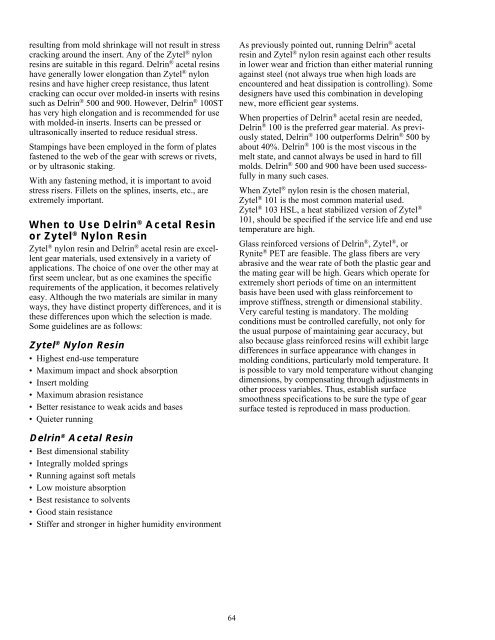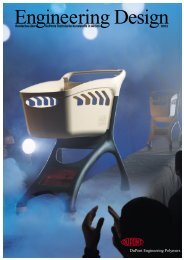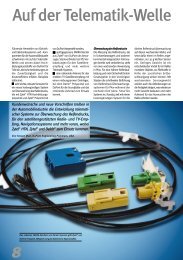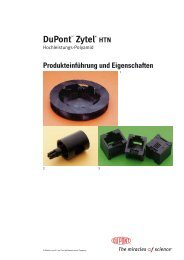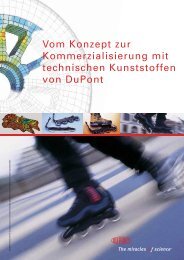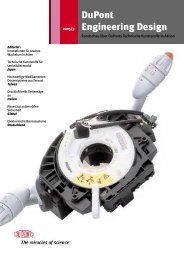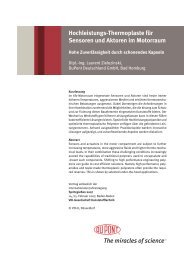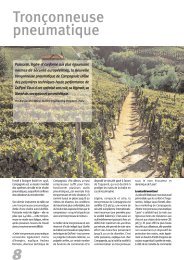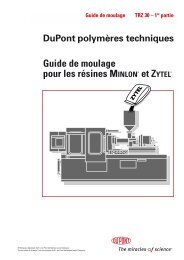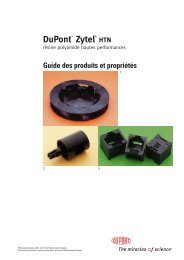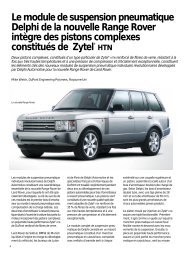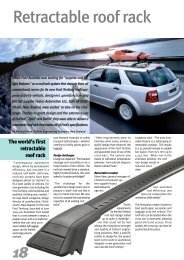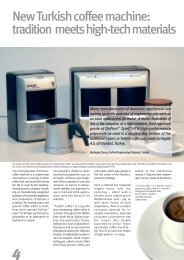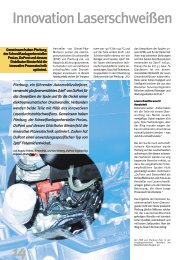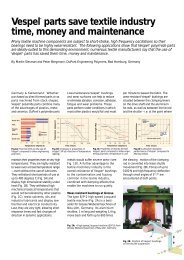General Design Principles for DuPont Engineering Polymers - Module
General Design Principles for DuPont Engineering Polymers - Module
General Design Principles for DuPont Engineering Polymers - Module
Create successful ePaper yourself
Turn your PDF publications into a flip-book with our unique Google optimized e-Paper software.
esulting from mold shrinkage will not result in stress<br />
cracking around the insert. Any of the Zytel ® nylon<br />
resins are suitable in this regard. Delrin ® acetal resins<br />
have generally lower elongation than Zytel ® nylon<br />
resins and have higher creep resistance, thus latent<br />
cracking can occur over molded-in inserts with resins<br />
such as Delrin ® 500 and 900. However, Delrin ® 100ST<br />
has very high elongation and is recommended <strong>for</strong> use<br />
with molded-in inserts. Inserts can be pressed or<br />
ultrasonically inserted to reduce residual stress.<br />
Stampings have been employed in the <strong>for</strong>m of plates<br />
fastened to the web of the gear with screws or rivets,<br />
or by ultrasonic staking.<br />
With any fastening method, it is important to avoid<br />
stress risers. Fillets on the splines, inserts, etc., are<br />
extremely important.<br />
When to Use Delrin ® Acetal Resin<br />
or Zytel ® Nylon Resin<br />
Zytel ® nylon resin and Delrin ® acetal resin are excellent<br />
gear materials, used extensively in a variety of<br />
applications. The choice of one over the other may at<br />
first seem unclear, but as one examines the specific<br />
requirements of the application, it becomes relatively<br />
easy. Although the two materials are similar in many<br />
ways, they have distinct property differences, and it is<br />
these differences upon which the selection is made.<br />
Some guidelines are as follows:<br />
Zytel ® Nylon Resin<br />
• Highest end-use temperature<br />
• Maximum impact and shock absorption<br />
• Insert molding<br />
• Maximum abrasion resistance<br />
• Better resistance to weak acids and bases<br />
• Quieter running<br />
Delrin ® Acetal Resin<br />
• Best dimensional stability<br />
• Integrally molded springs<br />
• Running against soft metals<br />
• Low moisture absorption<br />
• Best resistance to solvents<br />
• Good stain resistance<br />
• Stiffer and stronger in higher humidity environment<br />
64<br />
As previously pointed out, running Delrin ® acetal<br />
resin and Zytel ® nylon resin against each other results<br />
in lower wear and friction than either material running<br />
against steel (not always true when high loads are<br />
encountered and heat dissipation is controlling). Some<br />
designers have used this combination in developing<br />
new, more efficient gear systems.<br />
When properties of Delrin ® acetal resin are needed,<br />
Delrin ® 100 is the preferred gear material. As previously<br />
stated, Delrin ® 100 outper<strong>for</strong>ms Delrin ® 500 by<br />
about 40%. Delrin ® 100 is the most viscous in the<br />
melt state, and cannot always be used in hard to fill<br />
molds. Delrin ® 500 and 900 have been used successfully<br />
in many such cases.<br />
When Zytel ® nylon resin is the chosen material,<br />
Zytel ® 101 is the most common material used.<br />
Zytel ® 103 HSL, a heat stabilized version of Zytel ®<br />
101, should be specified if the service life and end use<br />
temperature are high.<br />
Glass rein<strong>for</strong>ced versions of Delrin ® , Zytel ® , or<br />
Rynite ® PET are feasible. The glass fibers are very<br />
abrasive and the wear rate of both the plastic gear and<br />
the mating gear will be high. Gears which operate <strong>for</strong><br />
extremely short periods of time on an intermittent<br />
basis have been used with glass rein<strong>for</strong>cement to<br />
improve stiffness, strength or dimensional stability.<br />
Very careful testing is mandatory. The molding<br />
conditions must be controlled carefully, not only <strong>for</strong><br />
the usual purpose of maintaining gear accuracy, but<br />
also because glass rein<strong>for</strong>ced resins will exhibit large<br />
differences in surface appearance with changes in<br />
molding conditions, particularly mold temperature. It<br />
is possible to vary mold temperature without changing<br />
dimensions, by compensating through adjustments in<br />
other process variables. Thus, establish surface<br />
smoothness specifications to be sure the type of gear<br />
surface tested is reproduced in mass production.


